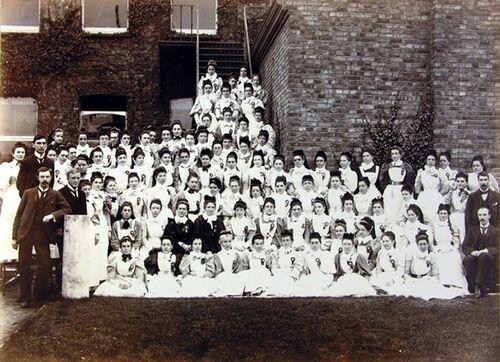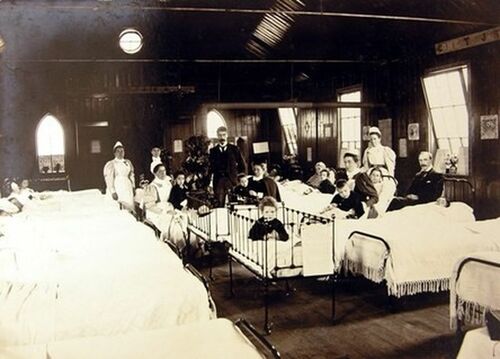Auction: 23001 - Orders, Decorations and Medals
Lot: 455
A rare Maidstone Typhoid Epidemic devoted service pair awarded to Beatrice Barnicoat, a private nurse in the employ of the Kent Nursing Institute
The epidemic raged from September 1897 until January 1898, affecting some 2000 people, 143 of whom died. But for the stoic and devoted service of around 200 medical staff, including a young nurse Edith Cavell, the death toll would have been far greater
News of the epidemic swiftly hit the headlines, a fund for 'stricken Maidstone' attracting donations from all over Europe, in addition to one from Queen Victoria, whose husband Albert had succumbed to typhoid back in 1861
Mercifully - and in common with the recent Covid-19 pandemic - rapid advances were made in countering the disease, the first recorded trial of immunisation against typhoid being undertaken on volunteers from a psychiatric hospital near Maidstone by a team under Professor Almoth Wright: none of the 84 who received the new vaccine developed the disease
Kent Nursing Institute, Devoted Service Cross, silver, unmarked, the reverse centre officially engraved, 'B. M. Barnicoat'; Maidstone Epidemic Medal 1897, silver, the reverse centre officially engraved, 'B. M. Barnicoat', complete with top riband brooch for wearing, extremely fine (2)
Although unmarked, the style of engraving on the Devoted Service Cross is identical to that on the Maidstone Epidemic Medal, thereby dating it to the same period.
Beatrice Mary Bandicoat was born at Landrake, Cornwall in July 1869, the daughter of the Rev. Humphrey Bandicoat and his wife Caroline.
Beatrice commenced her career as a probationary nurse at the Alexandra Hospital for Children in Bloomsbury, London in March 1888 and remained similarly employed until taking up a new appointment at the East London Hospital in May 1889.
In January 1892, she moved to the Radcliffe Institute, Oxford, in which post she was appointed a Staff Nurse and, in April 1893, she moved to the Jenny Lind Children's Infirmary in Norwich.
Devoted service: Maidstone 1897-98
However, the latter appointment proved short-lived for, later in the same year, she relocated to Tunbridge Wells to become a private nurse for the Kent Nursing Institute. It was in this capacity that she volunteered for duty in the Maidstone epidemic, the largest outbreak of typhoid fever ever reported in the United Kingdom. The 'Eurosurveillance' medical website takes up the story:
'It began September 1897 and ended in January 1898, affecting nearly 2000 people, 143 of whom died. At its peak 900 people contracted the disease in a two-week period. The cause was traced to contaminated mains water and its continuing spread was linked to the poor state of the drainage system and the housing of many of the victims.
It was a turning point in public health, featuring the first recorded trial of immunisation against typhoid and also of the sterilisation of a mains water supply, using chloride of lime. The typhoid immunisation trial was led by Professor Almoth Wright, who had developed the vaccine along with Richard Pfeiffer and Walter Kolle in 1896. Staff at a large psychiatric hospital near Maidstone were asked to volunteer for the trial: none of the 84 who received the new vaccine developed the disease, compared with four cases in the 120 who were not vaccinated. This established the vaccine's potential value and led to larger trials.
The chlorination of the water supply, organised by the bacteriologist Sims Woodhead, was a difficult procedure that required several attempts. Its success laid the foundations for continuous water treatment. The Maidstone outbreak may also have been the first in which telephones were used in the control of an epidemic, allowing doctors and nurses in the emergency hospitals to pass on information about cases.
The epidemic received unprecedented press attention. A fund for 'stricken Maidstone' attracted donations from all over Europe, particularly France and Italy. Queen Victoria, 78 years old and celebrating her 50th year on the throne at the time of the epidemic, sent a donation and a message of sympathy. Typhoid was common among the aristocracy: victims in the royal family included Victoria herself, Prince Albert (who died from typhoid in 1861), and two of their children.
The story of the outbreak reveals the plight of hop pickers - itinerant workers who helped with the hop and fruit harvest - as well as political and commercial pressures. The outbreak was costly and affected local businesses badly, with two exceptions: sales of bottled mineral water soared and breweries also benefited. Beer was considered safe because it was made using water from private wells.
Poor communications and false economies were singled out by the Public Inquiry, held in 1898: for example, no water samples had been taken for three months before the outbreak to save money, and there was confusion about the number of cases and when the outbreak had started. The numbers of cases recorded in the Public Inquiry were probably a gross underestimate as no precise case definition was used and cases in the workhouse for the homeless poor were not notified. It is likely that the introduction of typhoid immunisation and water sterilisation - a remarkable coincidence of two major public health advances during one outbreak - ensured that no epidemic as large has occurred in the U.K. since that time … '
Around 220 medical and municipal staff were subsequently awarded the Maidstone Epidemic Medal, in addition to a handful of Salvation Army staff.
In common with them all, Beatrice Bandicoat risked her life in the name of her chosen profession and - as evidenced by her additional Devoted Service Cross - likely in a notable manner. Given her earlier experience on children's wards, she may have been allocated to one of them in Maidstone. Either way, her story is well worthy of further research.
She died in Plympton, Devon in July 1957, aged 87.
Subject to 20% VAT on Buyer’s Premium. For more information please view Terms and Conditions for Buyers.
Sold for
£520
Starting price
£280











